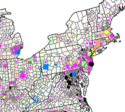Welcome to Griftopia. The Florida housing industry needs a karmic rebalancing. Our recent roar of building new structures is echoed today by the squeaks and pops of a different type of construction industry. Invasive testing – the architectural equivalent of a biopsy – seems to be on the rise. Saws, hammers, and cranes can be heard through the quiet suburban developments and subdivisions around Florida, as shingles and stucco are cut off in small patches to reveal serious problems within. read more »
Urban Issues
Chicago: Out of the Loop
The “global city” is one of the dominant themes related to urban success today. In this model, cities serve both as huge agglomerations of top specialized talent and also as “control nodes” of the global economy serving as key sites for the production of financial and producer services demanded by the new globalized economy. In her seminal book on the subject, Saskia Sassen noted New York, London, and Tokyo as the paradigmatic examples of the global city. read more »
Natural Gas Vehicles Floor It in Long Beach
The Alternate Clean Transportation Expo held in Long Beach earlier this month was a spectacular display of engineering ingenuity by Natural Gas Vehicle providers. The event's theme was that America’s self sufficiency in natural gas has decoupled our energy resources from petroleum prices. But the consensus among the gathered engineers and scientists was to look beyond the current prices of petroleum alone, and consider that domestic self sufficiency includes keeping jobs at home. read more »
Where Do the Children Play?
Are compact cities healthy cities? One argument for compact cities is that they are good for our health. The New Zealand Public Health Advisory Committee in 2008, for example, cited four principles for healthy urban planning based on the density of development: urban regeneration, compact growth, focused decentralisation, and linear concentration. The aim is less time in cars and more use of active transport. read more »
World Urbanization Update: Delhi 2nd in a World of Smaller Urbanization
Perhaps the most surprising development in urban areas over the past year was the ascendancy of Delhi to rank second in the world in population, following only Tokyo – Yokohama. Based upon the new United Nations population estimate, the 7th annual edition of Demographia World Urban Areas places Delhi's population at 22.6 million. read more »
- Login to post comments
Is The Information Industry Reviving Economies?
For nearly a generation, the information sector, which comprises everything from media and data processing to internet-related businesses, has been ballyhooed as a key driver for both national and regional economic growth. In the 1990s economist Michael Mandell predicted cutting-edge industries like high-tech would create 2.8 million new jobs over 10 years. This turned out to be something of a pipe dream. read more »
Can the Winnipeg Model Save Detroit?
Detroit, not only in the US but across the globe, has become the poster child for urban decay. The city lost 25% of its population between 2000-2010, and over half its population since 1950. Over 90,000 houses stand empty, and many neighborhoods have been completely abandoned. read more »
Fifty Years of Population Change in the US: 1960-2010
A new census leads us to ask how population has changed, but usually discussion is focused on changes since the last census. But even more interesting is to appreciate the vaster changes over a greater sweep of time, for example: the fifty years since 1960, when the United States had 179 million people, toward the end of the post-war Baby Boom. read more »
Queens, New York: Mr Bornstein's Neighborhood
Beauty is in the eye of the beholder. And most people who drive through blocks of industrial urban neighborhoods in Queens County, New York find them ugly, depressing, and sometimes dangerous. I spend a great deal of time in these kinds of neighborhoods, and to the shock and surprise of many - especially my close friends and family - I find them just as interesting and usually more exotic than the overly-planned communities touting the new urbanism popping up all over the country. read more »
- Login to post comments
Japan’s 2010 Census: Moving to Tokyo
For years, demographers have been predicting that the population of Japan would begin to decline. The census of Japan, conducted every five years, however, still continues to show slight population growth, with 288,000 people having been added between 2005 and 2010. This growth was so small that the nation of Japan added fewer people than seven US metropolitan areas (Dallas-Fort Worth, Houston, Washington, Atlanta, Riverside-San Bernardino, Phoenix and Raleigh) and less than the Toronto metropolitan area over the same period of time. read more »





















